Crossref Citations
This article has been cited by the following publications. This list is generated based on data provided by Crossref.
DeRue, D. Scott
Ashford, Susan J.
and
Myers, Christopher G.
2012.
Learning Agility: Many Questions, a Few Answers, and a Path Forward.
Industrial and Organizational Psychology,
Vol. 5,
Issue. 3,
p.
316.
Reeve, Charlie L.
Scherbaum, Charles
and
Goldstein, Harold
2015.
Manifestations of intelligence: Expanding the measurement space to reconsider specific cognitive abilities.
Human Resource Management Review,
Vol. 25,
Issue. 1,
p.
28.
Hezlett, Sarah A.
2016.
Enhancing Experience-Driven Leadership Development.
Advances in Developing Human Resources,
Vol. 18,
Issue. 3,
p.
369.
류혜현
and
Oh,Hun-Seok
2016.
Learning agility: Issues and Challenges.
The Korean Journal of Human Resource Development Quarterly,
Vol. 18,
Issue. 4,
p.
119.
Im, Changhyun
이효선
and
WEE YOUNG EUN
2017.
A study on the development of the learning agility scale.
The Korean Journal of Human Resource Development Quarterly,
Vol. 19,
Issue. 2,
p.
81.
박정열
and
Kim Jin-Mo
2019.
The Development of Workplace Learning Agility Assessment Inventory for Knowledge Workers.
The Korean Journal of Human Resource Development Quarterly,
Vol. 21,
Issue. 4,
p.
115.
Bywater, James
Hezlett, Sarah
Lewis, James
and
Owen, Catrin
2020.
Learning agility in a high change world.
Assessment and Development Matters,
Vol. 12,
Issue. 2,
p.
3.
Deepa, V.
Sujatha, R.
and
Baber, Hasnan
2021.
Ageing and Learning Agility –Mediating role of learning perception and Moderating role of technology leverage.
International Journal of Lifelong Education,
Vol. 40,
Issue. 5-6,
p.
514.
Bywater, James
Hezlett, Sarah
Lewis, James
and
Smith, Ann-Marie
2021.
The importance of coaching and learning agility in a high change world.
Assessment and Development Matters,
Vol. 13,
Issue. 1,
p.
18.
Çiftci, Didem Öztürk
2023.
Transformational Leadership Styles for Global Leaders.
p.
78.





